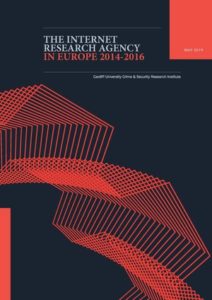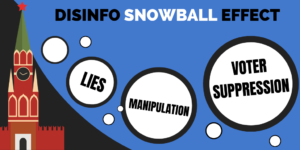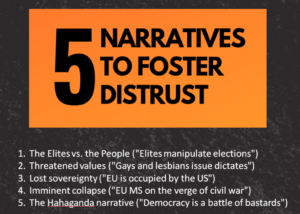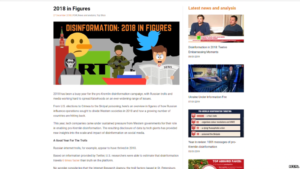 Evidence of the Kremlin-backed Internet Research Agency’s long-term interference in European politics and elections has been revealed in two new studies. Taken together the findings provide a strong indication of the kinds of disinformation campaigns that could be directed towards the 2019 European Parliamentary elections on 23 May, according to Cardiff University’s Crime and Security Research Institute.
Evidence of the Kremlin-backed Internet Research Agency’s long-term interference in European politics and elections has been revealed in two new studies. Taken together the findings provide a strong indication of the kinds of disinformation campaigns that could be directed towards the 2019 European Parliamentary elections on 23 May, according to Cardiff University’s Crime and Security Research Institute.
While Russian involvement in the 2016 US presidential election has been well documented, most recently in Special Counsel Robert Mueller’s report, far less has been known about the Internet Research Agency’s European operations, until now.
Key findings from a separate report out today, The Internet Research Agency in Europe 2014-2016, include:
-

EU vs Disinfo
An account identified by Twitter as an “Internet Research Agency-linked account” appears to have been engaging in reconnaissance activities of European Parliamentary election processes in Greece in 2014. Messages sent by the operator of this account include photographs of polling stations, images taken inside polling stations of ballot boxes and ballot papers as well as written accounts of interactions with election officials. The account operator also appears to have travelled to multiple other countries, including the US, Italy, Norway, France, the Netherlands, Israel, Thailand, Malaysia, Egypt, Hong Kong and Austria.
- In 2014, the Internet Research Agency sent nearly two million tweets in Russian but by 2016, this number had fallen to less than half a million. English had become the predominant language by 2016, with the Internet Research Agency also exploring the use of German, Arabic, Bulgarian, Estonian, French, Italian, Romanian and Spanish as it became increasingly interested in influencing audiences across multiple European countries. A number of the English and German accounts were especially interested in Brexit.
 Based upon the material contained within Twitter’s classification of Internet Research Agency-linked accounts, by 2016, there were 1,380 accounts that tweeted more than 1.5 million messages during that year.
Based upon the material contained within Twitter’s classification of Internet Research Agency-linked accounts, by 2016, there were 1,380 accounts that tweeted more than 1.5 million messages during that year.- During 2014, most of these accounts were concerned with the conflict in Ukraine and the annexation of Crimea. This appears to have been a key period in the expansion of the scale and intensity of Internet Research Agency activity.

Human Rights Watch
Professor Martin Innes, Director of the Crime and Security Research Institute, said: “Our reports clearly evidence a sustained and wide-ranging interest in European politics from social media accounts covertly run on behalf of the Kremlin. By examining in forensic detail some of the tactics and techniques featuring in their historic information-influence operations, this research affords urgent insights about the future threats to the integrity of the democratic process as we approach the 2019 European elections.”
An article published in the academic journal Political Quarterly outlines three key tactics that were used to amplify the influence of disinformation campaigns on social media:
- account buying;
- ‘follower fishing’; and
- narrative switching.
The authors Andrew Dawson and Martin Innes highlight three challenges:
 First, the importance of developing a better understanding of how Russian state assets have sought to use disinformation and misinformation to influence European politics. For understandable reasons, much of the public conversation to‐date has focussed upon the American situation. But there is significant evidence of similar influence and interference strategies being operationalised in Europe. …
First, the importance of developing a better understanding of how Russian state assets have sought to use disinformation and misinformation to influence European politics. For understandable reasons, much of the public conversation to‐date has focussed upon the American situation. But there is significant evidence of similar influence and interference strategies being operationalised in Europe. …- Second, …detailed ‘digital forensic’ investigative methods are needed to craft an evidence‐based understanding of how IRA operators built their audience and influence. This is on the grounds that identifying their key tactics and techniques may enable similar disinformation campaigns to be detected in other contexts.
 Finally, … some of the challenges with attributing authorship and impact to disinformation communications. This reflects how, not only have the US and its allies learned about some of the methods used to seed and amplify false and misleading information online, so too have those authoring such messages. Contemporary efforts at communicating disinforming narratives are increasingly sophisticated, as those involved are learning ‘what works’ in making messages more persuasive and in masking their origins.
Finally, … some of the challenges with attributing authorship and impact to disinformation communications. This reflects how, not only have the US and its allies learned about some of the methods used to seed and amplify false and misleading information online, so too have those authoring such messages. Contemporary efforts at communicating disinforming narratives are increasingly sophisticated, as those involved are learning ‘what works’ in making messages more persuasive and in masking their origins.
 In an article published by DisinfoPortal, Kremlin Watch Executive Director Jakub Janda evaluates certain aspects of the Action Plan against Disinformation issued by the European Commission, and how they are being implemented. What are the potential strengths and weaknesses of the Rapid Alert System? Can it have an impact on the upcoming European elections? What position should the European Commission take towards social media companies? And what is the future outlook for the EU’s fight against disinformation?
In an article published by DisinfoPortal, Kremlin Watch Executive Director Jakub Janda evaluates certain aspects of the Action Plan against Disinformation issued by the European Commission, and how they are being implemented. What are the potential strengths and weaknesses of the Rapid Alert System? Can it have an impact on the upcoming European elections? What position should the European Commission take towards social media companies? And what is the future outlook for the EU’s fight against disinformation?
“This autumn, a new European Commission will be formed. If the leaders of this Commission understand the geopolitical threats of today, they will recognize that disinformation cannot be neglected or treated as a low-priority threat. There are hundreds, if not thousands, of European specialists with extensive knowledge about disinformation and how to combat it ready to serve the common defence of the continent. If the collective political will arises to meaningfully implement and build upon it, the Action Plan against Disinformation can provide a hopeful framework. “
Read the full article here.







